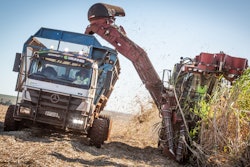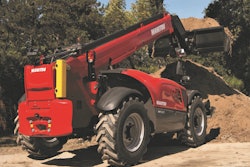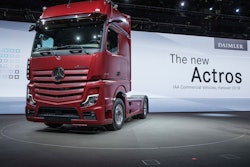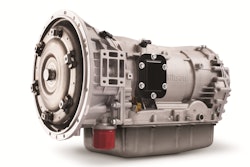WABCO Holdings Inc., the leading global supplier of braking control systems and other advanced technologies that improve the safety, efficiency and connectivity of commercial vehicles has signed a Memorandum of Understanding (MoU) with Baidu (NASDAQ: BIDU) to collaborate on developing a best-in-class, cost-effective and highly standardized suite of solutions for Level 4 Autonomous Driving in hub-to-hub highway applications for commercial vehicles. This will be a cornerstone of an open platform allowing OEMs and fleets to utilize WABCO’s and Baidu’s core safety and AI technologies while providing them an opportunity to develop customized, differentiated solutions.
Based on this strategic cooperation agreement, Baidu will bring the power of Apollo, its open autonomous driving software platform, proven in the passenger car segment, while WABCO will provide access to its own ADOPT™ (Autonomous Driving Open Platform Technology) ecosystem to simplify entry into WABCO’s world of advanced technologies for the commercial vehicle industry.
Taking the next step, the intent is to work together to combine the required content of Baidu’s Apollo software platform, integrating all the safety and redundancy protocols necessary for road release in order to develop turnkey, hub-to-hub, Level 4 highway solutions for the commercial vehicle world. The goal is to be able to commercialize these solutions over the next 3 years.
Finally, WABCO and Baidu will leverage the development across these commercialized platforms and open them up to WABCO customers (Fleets and OEs) allowing them to develop their own solutions that align with their specific autonomous driving goals. In order to develop these Level 4 autonomous driving applications, customers could either seek to leverage the existing full software stack, or select specific software modules and functionality.
“Commercial vehicles will be the first mover in autonomous driving adoption with promising prospects of commercialization. The Baidu Apollo platform is also striving to advance the pilot operation and final adoption in commercial vehicle application. As a global technology leader of commercial vehicle safety and control systems, WABCO brings about a unique ecosystem with comprehensive partnerships in the world of commercial vehicles,” says Zhenyu Li, Vice President, Baidu Intelligent Driving Group. “Baidu believes the cooperation between Apollo platform and WABCO, combining the respective strengths of both parties, will help our partners minimize repetitive and basic development efforts, and eventually accelerate autonomous driving application of commercial vehicles.”
“We are excited to bring our commercial vehicle expertise to this partnership with Baidu, already a strong open software platform leader in the autonomous driving segment for passenger cars,” says Dr. Christian Brenneke, Chief Technology Officer and Head of Engineering, WABCO. “By connecting WABCO’s ADOPT ecosystem to Baidu’s technologies, we will help simplify and optimize the needs of commercial vehicle customers in the autonomous world, thus empowering them to develop custom solutions for autonomous driving in a fast and efficient manner.”
Bringing together WABCO’s ADOPT and Baidu’s Apollo open platform into the commercial vehicle world will help accelerate the adoption of Level 4 autonomous driving. Additionally, for WABCO’s customers today and tomorrow, it will open up a world of choices and benefits – speed to market, lower R&D investments, flexibility and access to true domain experts – aligned with the pace of their own autonomous driving journeys.
WABCO at IAA Commercial Vehicles 2018
WABCO will showcase its industry-leading technologies and services that improve the safety, efficiency and connectivity of commercial vehicles worldwide at IAA Commercial Vehicles 2018. This includes the latest technologies in braking, advanced driver assistance, fleet management solutions and aerodynamics.



















